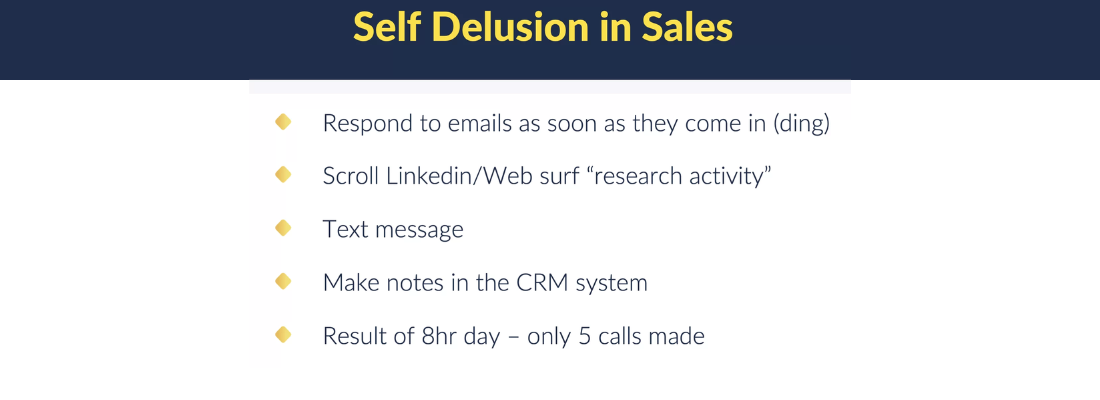Salespeople Are Delusional

Most salespeople tend to be delusional in how they spend their time. They think they are doing a lot more “revenue-generating activities” than they actually are. This directly results from poor planning, not measuring activities and self-delusion.
Does this example sound familiar?
The salesperson arrives at their desk at 9 a.m. first thing he does is check emails. They read them all, respond to some; none are critical, but lose track of time. An hour goes by. Then they remembered that they have a 10:30 Zoom meeting. They return at 11:30. And no sales calls or outbound activity has been conducted. The salesperson answers some more emails and then goes to lunch.
They come back from lunch around 1 pm and log into the CRM. Which they don’t like or use all that often. The salesperson looks for who to call does some “research” before the call, and it is now 2:15 before they have even made their first call.
Then, the salesperson leaves a voicemail and calls two other potential clients. They get frustrated, so then they cope with that stress by pulling out their phone and scrolling through social media. Twenty minutes passed, and while the salesperson was scrolling, they unconsciously compared themselves to others. Now, the salesperson feels less confident.
They check their watch; it’s 3:30, and they go back to checking their email and do other administrative work before ending the day at 5 p.m.
So, in an entire day, the salesperson made only five phone calls.
What’s the answer? The Sales Time System.
Identify your top revenue-generating and non-revenue-generating activities every day. Then, block off time and set a timer.
Fifty minutes is an excellent place to start. Block off time when you can solely focus on all your revenue-generating activities. And during that time, you don’t respond to emails or text messages. Focus on your most important calls and activities that will produce revenue. Take a break after the time is up, set time for another fifty minutes, and knock out your non-revenue generating activities. Take a break, return, and plan your revenue-generating activities for tomorrow.
Rinse and repeat.
Structuring your day like this still gives you plenty of time to do other activities.
by Eric Papp
